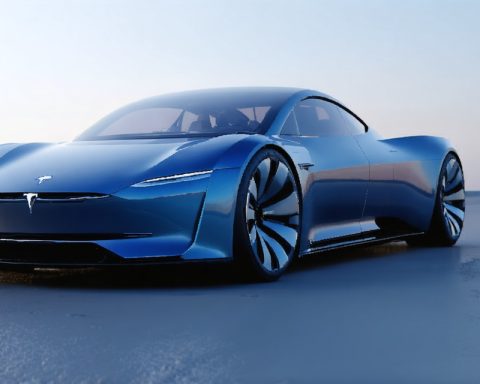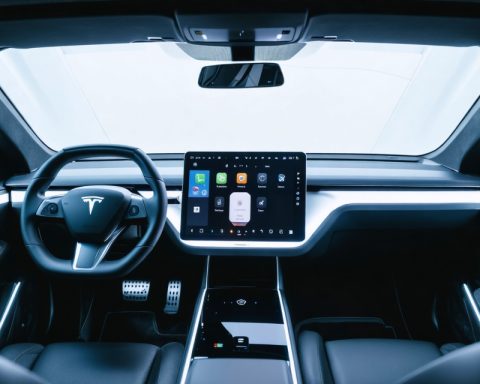- Rivian Automotive’s stock surged 10% following strategic shifts, including appointing Sreela Venkataratnam as Chief Accounting Officer to strengthen financial strategy.
- Partnership with XPEL broadens customization options for R1T and R1S models, enhancing customer appeal in the competitive EV market.
- Rivian’s alliances, such as with Volkswagen, aim to diversify revenue and enhance technological solutions.
- Secured a $6.6 billion loan from the US Department of Energy for expansion at the Georgia plant, indicating growth ambitions.
- Faced a class-action lawsuit over demand and production projections, highlighting the challenges in scaling.
- Despite challenges, Rivian demonstrates resilience and foresight, with both opportunities and obstacles shaping the future of electric mobility.
In a landscape dominated by the ever-evolving auto industry, Rivian Automotive emerges with a surge of momentum. The electric vehicle (EV) powerhouse caught the market’s attention this week as its stock price rose a compelling 10%. This ascent was not coincidental; it was fueled by strategic shifts and promising alliances.
At the heart of this surge lies a key appointment that signals Rivian’s robust financial maneuvering: Sreela Venkataratnam steps into the role of Chief Accounting Officer. This strategic move marks Rivian’s commitment to shoring up its financial acumen, positioning the company to navigate future growth with precision and clarity.
Beyond the boardroom, Rivian’s collaboration with XPEL introduces a new palette of possibilities for proud R1T and R1S owners. Expanded customization options invite adventure-seekers and eco-conscious consumers alike to personalize their vehicles, providing a fresh avenue for customer engagement. This partnership not only enhances product offerings but also broadens Rivian’s appeal in the competitive EV market.
The broader market backdrop painted a supportive picture for Rivian’s upswing. With both the Nasdaq Composite and S&P 500 rebounding slightly, investors showed renewed confidence, setting a favorable stage for Rivian’s impressive performance.
However, Rivian’s journey has been a balancing act. Despite a 14.46% total return over the past year, this trails behind the remarkable 44.5% rise of the broader US Auto industry. Yet, this should not overshadow Rivian’s strides. The company’s alliance with Volkswagen unveiled in November 2024 focuses on developing groundbreaking electrical and software solutions for EVs, promising to diversify its revenue streams and fortify its technological edge.
Rivian’s operational ambitions were further solidified with a secured $6.6 billion loan from the US Department of Energy, bolstering expansion efforts at its Georgia manufacturing plant. This infusion of capital underscores Rivian’s growth trajectory and its resolve to revolutionize the EV landscape.
Yet, challenges remain. A class-action lawsuit in June 2024 alleged oversights in demand projections and production capabilities, a hurdle that underscores the complexities of scaling in the competitive auto sector.
The essential takeaway: Rivian’s dance through the volatile market is a testament to its resilience and strategic foresight. As it continues to trailblaze, both opportunities and obstacles will serve as vital catalysts in shaping the future of electric mobility. Investors and consumers alike watch closely, poised to witness how Rivian continues to harness its innovative energy to navigate the dynamic road ahead.
Rivian’s Rapid Rise: What It Means for the Future of EVs and Your Portfolio
Rivian’s Strategic Moves: An Overview
Rivian Automotive recently captured significant attention with its stock price surging by 10%, showcasing its strategic prowess and innovative advancements in the electric vehicle (EV) sector. Several key developments contribute to Rivian’s current trajectory, promising a potentially transformative impact on the EV market and investor portfolios.
Key Appointment and Financial Strategy
The appointment of Sreela Venkataratnam as Chief Accounting Officer marks a critical step in Rivian’s financial evolution. Her expertise is anticipated to enhance the company’s financial operations, better positioning Rivian for sustainable growth and profitability. This strategic move reinforces Rivian’s commitment to robust financial management and underscores its readiness to tackle upcoming financial challenges. For more on similar strategic business decisions, visit Forbes.
Strategic Partnerships: Customization Collaboration
Rivian’s partnership with XPEL expands customization possibilities for the R1T and R1S models. This collaboration not only elevates the personalization of their vehicles but also broadens their market appeal. For eco-conscious consumers and adventure seekers, these customized options enhance the ownership experience, solidifying Rivian’s position in the competitive EV market.
Market Context and Performance
Rivian’s stock surge aligns with broader market trends, with the Nasdaq Composite and S&P 500 experiencing slight rebounds. However, Rivian’s performance, despite a notable 14.46% return over the past year, still lags behind the broader US auto industry’s impressive 44.5% increase. This highlights both the potential and challenges Rivian faces as it competes with established automakers.
Emerging Collaborations and Technological Development
A critical element of Rivian’s strategy involves its alliance with Volkswagen, announced in November 2024. This partnership focuses on developing advanced electrical and software solutions, crucial for next-generation EVs. This development is set to diversify Rivian’s revenue streams and enhance its technological capabilities, indicating robust future growth. Insights on similar partnerships can be found at Bloomberg.
Financial Backing and Expansion Plans
Rivian’s future expansion received a significant boost with a $6.6 billion loan from the US Department of Energy, designated for its Georgia manufacturing plant. This capital infusion is pivotal in supporting Rivian’s growth ambitions and revolutionizing the EV landscape. It highlights the increasing government support for EV development, reflecting broader industry trends favoring sustainability and innovation.
Addressing Challenges: Lawsuits and Market Dynamics
Despite its growth, Rivian faces challenges, including a class-action lawsuit alleging oversights in demand projections and production capabilities. Such legal hurdles illuminate the complexities of scaling operations within the competitive automotive sector. Navigating these challenges will require strategic foresight and operational agility.
Real-World Use Cases and Market Potential
Rivian’s advancements have real-world implications, particularly for consumers seeking sustainable and innovative transportation solutions. The company’s focus on customization, technological collaboration, and financial strategy aligns with global trends prioritizing sustainability and innovation in the automotive industry.
Actionable Recommendations for Investors and Consumers
1. For Investors:
– Monitor Rivian’s strategic partnerships, particularly with Volkswagen, as they could significantly affect stock performance.
– Consider the financial health strategies, such as the appointment of a new Chief Accounting Officer, which can impact long-term profitability.
2. For Consumers:
– Explore Rivian’s customizable options offered in collaboration with XPEL for a personalized vehicle ownership experience.
– Stay informed about Rivian’s technological advancements, which could enhance vehicle performance and sustainability.
Conclusion
Rivian’s story is one of strategic partnerships, financial adeptness, and innovation in the EV sector. As the company navigates challenges and capitalizes on opportunities, both investors and consumers have much to gain from staying informed about Rivian’s evolving trajectory. For further insights on market trends and investment strategies, browse CNBC.












